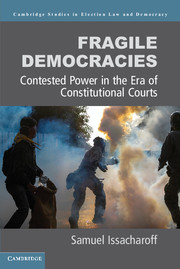The following is the first of three guest posts by NYU’s Sam Issacharoff about his new book, Fragile Democracies:
I appreciate Rick’s invitation to say a few words about my book that came out over the summer, Fragile Democracies: Contested Power in the Era of Constitutional Courts (Cambridge University Press, 2015).
The basic thesis is that the late 20th century witnessed a shift in how to address the characteristic disabilities of democracies, particularly at their founding. The key shift was toward a firmer form of constitutional constraint on political power, and the enabling of strong constitutional courts with ample power of judicial oversight of politics. The introductory chapter is available on SSRN. This format allows me to say a few words about the background themes.
The first characteristic disability comes with the lack of an organic polity in most new democracies. Political thought of the 19th century, notably with Toqueville and Mill, assumed that democracy could only survive from a sense of shared enterprise among a people that spoke the same language, worshipped the same god, and accepted a commonly bound history. The post-colonial emergence of nation states in the early and mid-parts of the 20th century violated each of these principles, as did the third wave following the collapse of the Soviet Union.
Second any democracy is porous to its internal enemies, parties that seek to exploit the electoral forum to mobilize for the destruction of democracy itself. The post-Nazi commitment to “militant democracy” able to protect itself against extreme challenge itself poses a threat that every dissident voice will be seen as an existential affront.
Third, it is all well and good to set out a blueprint for a functioning democracy, complete with rival political parties and institutional separation of powers. Decreeing it does not make it so. Almost invariably a centralizing power emerges, usually in the form of a hypertrophic executive through whom authority and lucre may be realized. Electoral competition is stifled, clientelism and corruption emerge, and the promise of democracy fails. This is all the more menacing when the emergent power has the authority of a historic transition to draw upon, as with the PRI in Mexico or the ANC in South Africa.
The main argument of the book is that by the end of the 20th century, court-enforced constitutionalism had emerged as the critical response to each of the three disabilities. The earlier enthusiasm for formal power sharing under consociational arrangements had waned amid the civil wars that ravaged Cyprus, Ivory Coast, Sri Lanka, and others. Strong constitutionalism was an alternative source of limitations on dominant group power in areas as diverse as lustration campaigns, language requirements for political participation, removal of institutional checks on executive unilateralism, and a host of related mechanisms that entrenched officeholders at the expense of competitive accountability. Examples are drawn not only from the newly created democracies of Europe and Asia, but from the experiences of India, Turkey, South Africa, Mexico, Israel, and contested democracies around the world.
In the next posts, I will address how constitutionalism can function under court-oversight, and what are its prospects for stabilizing democracy in fractured societies
